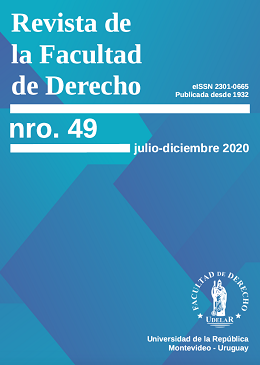La Corte Internacional de Justicia en el asunto Jadhav (India v. Pakistan) y un acople normativo demorado:
derecho a ser informado a la asistencia consular y los derechos humanos
DOI:
https://doi.org/10.22187/rfd2020n49a16Palabras clave:
Derecho a ser informado, asistencia consular, Corte Internacional de Justicia, Convención de Viena sobre Relaciones Consulares, Derechos Humanos, Corte Interamericana de Derechos HumanosResumen
El presente artículo analiza críticamente la jurisprudencia de la Corte Internacional de Justicia en relación con la interpretación y aplicación del artículo 36 de la Convención de Viena sobre Relaciones Consulares. Esta vez al hilo del reciente fallo en el caso Jadhav (India v. Pakistan), en el cual la Corte mantiene una línea jurisprudencialque se analiza en sus limitaciones en relación con los derechos humanos y que tiene antecedentes. Se pretende demostrar, mediante el análisis normativo y jurisprudencial como método esencial del trabajo, que todavía no se han producido avances decisivos en el reconocimiento del derecho a ser informado a la asistencia consultar como un derecho humano que disponga de autonomía en el plano jurídico. La Corte Internacional de Justicia no extrae todas las consecuencias en el campo de los derechos humanos en esta temática. Este trabajo tendría el valor de apuntar las líneas que debería seguir la jurisprudencia de la Corte para acoger la tendencia a ocuparse de los asuntos sobre derechos humanos.
Descargas
Citas
Andrés Sáenz de Santamaría, P. (2013). Una nueva contribución a la fijación de la indemnización por hecho internacionalmente ilícito: la Sentencia de la Corte Internacional de Justicia de 19 de Junio de 2012 en el asunto Ahmadou Sadio Diallo. En S. Torres Bernárdez (coord.), El derecho internacional en el mundo multipolar del siglo XXI: obra homenaje al profesor Luis Ignacio Sánchez Rodríguez, pp. 203-218.
Bedi, S. (2007). The Development of Human Rights Law by the Judges of the International Court of Justice. Oregon: Oxford-Portland.
Bruno Simma, B. (2012). Human Rights Before the International Court of Justice: Community Interest Coming to Life? En: Holger Hestermeyer [et al.], Coexistence, cooperation and solidarity: liber amicorum Rüdiger Wolfrum. Leiden/Boston: Martinus Nijhoff Publishers, 577-604.
Cançado Trindade,A. A. (2013). El difícil camino del acceso de la persona humana a la justicia en el contencioso interestatal ante la Corte Internacional de Justicia. AHLADI, (21), 173-213.
Cançado Trindade. A. A. (2003). International Law for Humankind Towards a New Jus Gentium. Leiden/Boston: Martinus Nijhoff Publishers.
Crawford, J., y Keene, A. (2019). Interpretation of the human rights treaties by the International Court of Justice. The International Journal of Human Rights. https://doi.org/10.1080/13642987.2019.1600509
Deen-Racsmány, Z. (2002). Diplomatic Protection and the LaGrand Case. Leiden Journal of International Law, (15), 87-103.
Díaz Barrado, C. M. (2004). El Derecho Internacional del Tiempo Presente. Madrid: Dykinson.
Dubey, A. (2017). The Jadhav Case Before the International Court of Justice. Indian Journal of International Law, 57, 357–384. https://doi.org/10.1007/s40901-017-0067-2
Giorgetti, C. (2008). Introductory note to international court of Justice: Request for Interpretation of the Judgment in the case concerning Avena and other Mexican nationals. International Legal Materials, 5(47), 723-725.
Higgins, R. (2007). Human Rights in the International Court of Justice. Leiden Journal of International Law, (20), 745–751.
Jenning, R. (2002). The Lagrand Case. The Law and Practice of International Courts and Tribunals (1), 13–54.
Kammerhofer, J. (2003). The Binding Nature of Provisional Measures of the International Court of Justice: the ‘Settlement’ of the Issue in the LaGrand Case. Leiden Journal of International Law, (16), 67-83.
Mennecke, M., y Tams, C. J. (2002). Lagrand Case (Germany v United States of America). The International and Comparative Law Quarterly, 2(51), 449-455.
Meron, T. (2006). The Humanization of International Law, General Courseon Public International Law, Hague Academy of International Law. Martinus Leiden-Boston, Nijhoff Publishers.
Orakhelashvili, A. (2002). Questions of International Judicial Jurisdiction in the LaGrand Case. Leiden Journal of International Law, (15), 105-130.
Orakhelashvili, A. (2005). Judicial Competence and Judicial Remedies in the Avena Case. Leiden Journal of International Law, 18, 31-48.
Pastor Palomar, A. (2010). La protección diplomática mediante la Corte Internacional de Justicia a favor del Sr. Diallo, empresario de la República de Guinea en la República Democrática del Congo. Sentencia de la CIJ de 24 de mayo de 2007. Asunto “Ahmadou Sadio Diallo” (República de Guinea c. República Democrática del Congo). En: L. I. Sánchez Rodríguez [et. al], El poder de los jueces y el estado actual del derecho internacional: análisis crítico de la jurisprudencia internacional (2000-2007), pp. 589- 604.
Petit De Gabriel, E.W., (2017). Los “derechos consulares” de los extranjeros
detenidos: ¿Nuevas cartas en la baraja de los derechos fundamentales? Revista Electrónica de Estudios Internacionales, 33. https://doi.org/10.17103/reei.33.07
Polak, M. J. (2017). The Jadhav case and the right to consular assistance: ‘confessions’ , spies, and remedies in international law. Indian Journal of International Law, 57, 385–409. https://doi.org/10.1007/s40901-018-0077-8
Pulkowski, D. (2006). Testing Compliance Theories: Towards US Obedience of International Law in the Avena Case. Leiden Journal of International Law, (19), 511-554.
Shelton, D. L. (2004). Case concerning Avena and Other Mexican Nationals (Mexico v. United States). The American Journal of International Law, (98), 3, 2004, 559-566.
Sreenivasa Rao, P. (2016). The Jadhav case (2017): India and Pakistan before the International Court of Justice. Indian Journal of International Law, 56,379–403. https://doi.org/10.1007/s40901-017-0063-6
Villegas Delgado, C. (2020). La Corte Internacional de Justicia y la paulatina humanización del Derecho consular: de Breard a Jadhav. Revista Electrónica de Estudios Internacionales, 39. https://doi.org/10.17103/reei.39.04
Publicado
Cómo citar
Número
Sección
Licencia
Los autores conservan sus derechos de autor y ceden a la revista el derecho de primera publicación de su obra, el cuál estará simultaneamente sujeto a la licencia Creative Commons Reconocimiento 4.0 Internacional License. que permite compartir la obra siempre que se indique la publicación inicial en esta revista.



